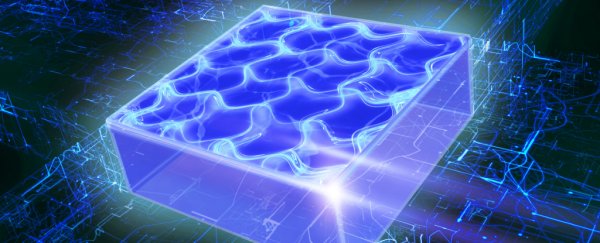In a significant achievement, physicists have produced a two-dimensional supersolid in the lab for the first time.
That may sound incredibly mind-bendy, but it's a feat researchers have been working towards for more than 50 years. Supersolids are strange materials with atoms arranged in the ordered structure of a solid, yet they can flow without friction, just like a superfluid.
Two years ago, physicists successfully created supersolids using ultra-cold magnetic atoms… but only in one-dimension. Now, a team of Austrian researchers has managed to create the crystal-like structure in 2D for the first time; the result will allow physicists to test and experiment with some of the weirdest materials-science phenomena out there.
"To picture a supersolid, consider an ice cube immersed in liquid water, with frictionless flow of the water through the cube," writes physicist Bruno Laburthe-Tolra from the Laser Physics Laboratory in Paris, in a News & Views article published alongside the new paper in Nature today.
This strange duality means supersolids are referred to as a quantum mechanical state of matter.
That's because, like with other quantum phenomena (think entanglement or Schrödinger's cat), the particles in a supersolid state are both locked into a rigid solid structure, but also delocalized at the same time, which allows them to behave like a wave and flow freely without friction throughout the solid.
Supersolidity was first predicted in 1969, and has long been studied in superfluid helium, which was considered the best candidate to find evidence of a solid, crystal-like structure with the properties of a superfluid. However, despite decades of research, supersolidity in helium remains elusive.
More recently, researchers have turned their focus towards ultra-cold quantum gases - clouds of strongly magnetic atoms that are chilled to close to absolute zero. The fact these atoms are magnetized means they interact in unique ways that can lead to this strange quantum mechanical state of supersolidity.
"Normally, you would think that each atom would be found in a specific droplet, with no way to get between them," says physicist involved in the new breakthrough Matthew Norcia from the University of Innsbruck in Austria.
"However, in the supersolid state, each particle is delocalized across all the droplets, existing simultaneously in each droplet. So basically, you have a system with a series of high-density regions (the droplets) that all share the same delocalized atoms."
While the Austrian team, led by quantum physicist Francesca Ferlaino from the University of Innsbruck and the Austrian Academy of Sciences, was one of several to create a string of droplets along one dimension that demonstrated supersolidity back in 2019, they needed to tweak their magnetic model in order to create a 2D version, with two or more rows of droplets.
This latest achievement opens up the phenomena they can study with these strange clouds of gas.
"For example, in a two-dimensional supersolid system, one can study how vortices form in the hole between several adjacent droplets," says Norcia.
"These vortices described in theory have not yet been demonstrated, but they represent an important consequence of superfluidity."
There's still a lot to learn about this strange supersolid quantum gas; for example, the researchers aren't sure if they could make a larger supersolid, as the state of matter is incredibly sensitive to the magnetic trap they've created.
But for now the fact the team has managed to create the first 2D supersolid is a huge feat in itself, that will inevitably lead to a greater understanding of this weird state of matter, and the invisible, quantum forces that govern our reality.
The research has been published in Nature.
